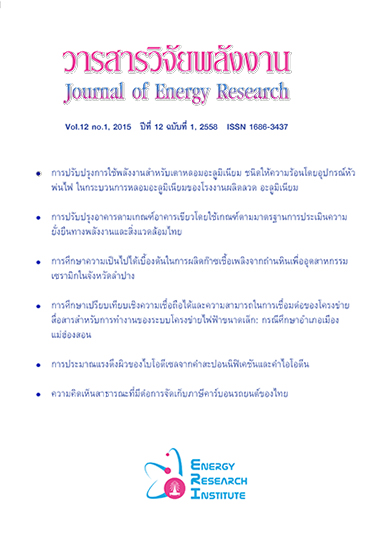ความคิดเห็นสาธารณะที่มีต่อการจัดเก็บภาษีคาร์บอนรถยนต์ของไทย
Main Article Content
Abstract
สืบเนื่องจากประเทศไทยได้มีนโยบายเปลี่ยนรูปแบบการจัดเก็บภาษีสรรพสามิตรถยนต์ จากเดิมที่ใช้ขนาดเครื่องยนต์และประเภทรถยนต์เป็นตัวกำหนดอัตราจัดเก็บภาษี ไปสู่รูปแบบใหม่ที่ใช้ปริมาณการปล่อยคาร์บอนไดออกไซด์ เป็นตัวกำหนดอัตราจัดเก็บภาษีแทน ซึ่งจะมีผลบังคับใช้ในปี พ.ศ. 2559 การศึกษานี้จึงทำการสำรวจความคิดเห็นประชาชนและผู้มีส่วนเกี่ยวข้อง ที่มีต่อการจัดเก็บภาษีสรรพสามิตรถยนต์รูปแบบใหม่ของไทย โดยขั้นตอนการศึกษาประกอบด้วย การศึกษามาตรการการจัดเก็บภาษีรถยนต์ในประเทศไทยและในต่างประเทศ การคำนวณภาษีสรรพสามิตรถยนต์รูปแบบใหม่เปรียบเทียบกับรูปแบบเก่าสำหรับรถยนต์บางรุ่น เพื่อเปรียบเทียบราคาที่เปลี่ยนไปของรถยนต์แต่ละรุ่น การสำรวจความคิดเห็นประชาชนผู้ใช้รถยนต์ ผู้แทนจำหน่ายรถยนต์ และนักวิชาการ ที่มีต่อมาตรการจัดเก็บภาษีสรรพสามิตรถยนต์รูปแบบใหม่ จากผลการศึกษาสรุปได้ว่า ผู้ให้ความเห็นส่วนใหญ่ เห็นด้วยกับการจัดเก็บภาษีสรรพสามิตรถยนต์โดยใช้ปริมาณการปล่อยคาร์บอนไดออกไซด์เป็นเกณฑ์ในการกำหนดอัตราจัดเก็บภาษี เป็นการส่งสัญญาณที่ดีในเรื่องการให้ความสำคัญกับสิ่งแวดล้อม รวมถึงเป็นแรงผลักดันให้ผู้ผลิตคิดค้นเทคโนโลยีที่เป็นมิตรกับสิ่งแวดล้อมมาใช้ปรับปรุงพัฒนาเครื่องยนต์ให้ปล่อยคาร์บอนไดออกไซด์ลดต่ำลง รวมทั้งจูงใจให้ผู้บริโภคหันมาเลือกซื้อรถที่เป็นมิตรกับสิ่งแวดล้อมมากขึ้น และผลการสำรวจพบว่าราคารถยนต์ที่เปลี่ยนไปตามโครงสร้างภาษีสรรพสามิตรูปใหม่ ไม่ส่งผลต่อการตัดสินใจเลือกซื้อรถของประชาชน อย่างไรก็ตามการจัดเก็บภาษีในขั้นตอนของภาษีสรรพสามิตนั้นยังไม่ตอบโจทย์การลดการปล่อยคาร์บอนไดออกไซด์อย่างเด่นชัด ควรต้องพิจารณาการจัดเก็บภาษีในส่วนของการใช้งานเพิ่มเติมด้วย
Public opinion on automotive carbon tax of thailand
Rewadee Limawatanachai1 and Dawan Wiwattanadate2
1Energy Technology and Management, Graduate School–Interdisciplinary Program. Chulalongkorn University
2Department of Mining and Petroleum Engineering, Faculty of Engineering, Chulalongkorn University
Royal Thai Government has policy to change the existing automotive excise tax, based on vehicle type and engine size, to the new one based on carbon dioxide emission, which becomes effective on January 2016. This study therefore aimed to survey public opinion and suggestion on this new automotive excise tax. The study started with literature review on automotive tax measures, both in Thailand and foreign countries. Comparative calculation of the existing automotive excise tax with the new one for selected vehicle models to compare the price change of each vehicle model. The resulting information was used for opinion survey with car using citizen, car dealers, and academia. The survey found that most respondents agreed with the policy on calculation of automotive excise tax based on carbon dioxide emission because it has become a good sign for environmental concerns and also a driving force for manufacturer to develop higher efficiency products with lower carbon dioxide emission. In addition, this new excise tax is supposed to motivate customers to buy more environmental friendly car. The study found that the price change due to the new excise tax seemed to have no effect on customer’s buying decision. However, some respondent suggested the automotive carbon tax would be included not only in the excise tax but also in the yearly automotive tax.

